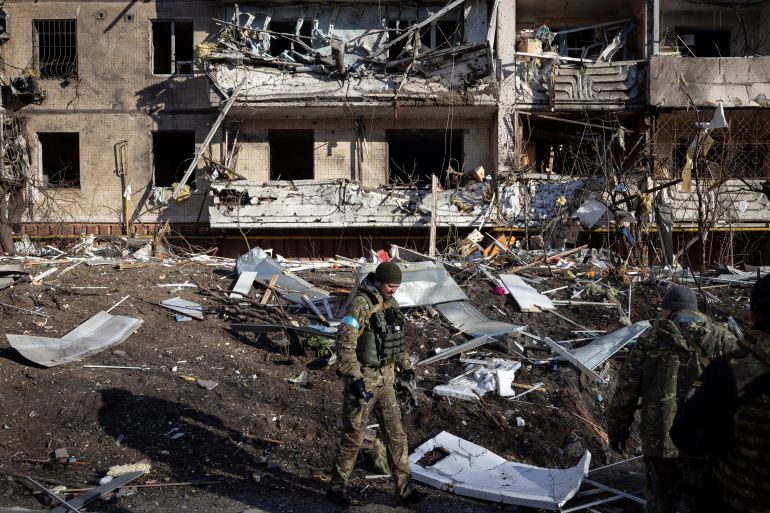War deepens suffering for Ukraine’s drug users
At a time of increased stress, withdrawal medication is hard to find while blackmarket drug prices soar.

“You ask me how things are going? This is how things are going,” Serhiy messaged in an online chat, before sending a photo of a high-calibre sniper rifle set up in his room in Kyiv, as Ukraine’s capital tries to fight off Russian forces.
“My task is to open fire when the enemy crosses next to my house. Otherwise we will all be destroyed.”
Keep reading
list of 4 itemsWNBA star Brittney Griner arrested in Russia on drug charges
Who benefits from the war on drugs?
Russian media say top Olympic skater failed drug test
Anyone willing to fight, like Serhiy, has been handed a rifle. But on top of dodging Russian bombs, as a drug-dependent Ukrainian, he is suffering agonising withdrawal.
“I’m taking Lyrica [pregabalin],” he said.
“It reduces withdrawal, but you can’t find it every day. You have to go and search for an open pharmacy, of which maybe one out of seven which were open pre-war still remain.
“Today, I went around five pharmacies where I used to get methadone on prescription. None were open. Another place was open today, but there was a queue of at least 200 people and I didn’t want to go into withdrawal right there, and so I went home.”
Eventually, Serhiy managed to find a private pharmacy where an acquaintance sold him pregabalin under the counter.
Before the war, Kyiv-based Vitalii Lavryk was a committee member of the Eurasian Harm Reduction Association, where he represented Ukraine, Moldova and Belarus; harm reduction is the practice of helping drug users stay as stable and healthy as they can be in their circumstances.
He told Al Jazeera, “The problem is that in Ukraine, there are a huge number of paid support programmes for opiate addicts.
“On average, a typical fee-based centre served 30 to 70 opiate-dependent patients per day. In Kyiv, there are more than 45 such paid centres, and they closed when the doctors evacuated.
“There, prescriptions were written for drugs that were bought in one of the pharmacy chains licensed to sell narcotic substances. Now, many pharmacies are closed or only open for three hours due to the curfew.”
In Ukraine, harm reduction included giving addicts methadone to ease them off street drugs such as heroin. There are more than 1,300 such patients registered in Kyiv alone.
Russia, on the other hand, does not accept methadone as a treatment, instead seeing it as just another noxious narcotic.
When Russian forces took the Crimean Peninsula from Ukraine in 2014, they shut methadone clinics.
Addicts reverted back to heroin and within a year, out of approximately 800 registered methadone patients, at least 80 people had fatally overdosed, killed themselves or died of other narcotic causes.
Meanwhile in the self-proclaimed Donetsk and Luhansk People’s Republics, pro-Russian rebels forced addicts to dig trenches at gunpoint, and there were reports of dealers being taken into the countryside and executed.
Al Jazeera was unable to independently verify these reports.
Now, as Russia wages war in Ukraine, those suffering addiction are feeling the impact on their health.
“Doses [of substitute drugs] have been cut, and in the city of Kharkiv, the only supplies of methadone and buprenorphine have been cut off,” said Lavryk. “Due to the war, other supplies are disrupted as well.”
Looking to the future, he added, “I assume that after the end of the war, many drug users will return to using again. It all depends on the number of victims. The more suffering, the more addiction.”
People involved in the illegal drug economy have been affected, too.
Like in Russia, a huge portion of the black market is served by the darknet, with customers placing orders online then picking them up at a hidden drop site known as a “treasure”, and those who plant the goods at the special spot are called “treasure-men”.
“While the problem lies in the unleashing of a humanitarian crisis by the occupiers, it is now almost impossible to get drugs in Kyiv,” explained Serhiy.
“The work of the treasure-men is paralysed and the prices have skyrocketed. My dose used to cost $4-6, now it’s $70-80. You can’t find a dealer anywhere, because if our military and territorial defence spot someone planting a treasure they may think they’re leaving a signal for an air strike, and use force.”
Meanwhile, alcohol has also fallen out of reach for many, as several areas of Ukraine have outlawed liquor sales under martial law.
Dessa Bergen-Cico, professor of public health and addiction studies at Syracuse University, told Al Jazeera by email, “The civilian population of Ukraine has been besieged by conflict and instability, which increases the risk factor for substance use and trauma.”
She added that the use of alcohol and drugs rises during war because security and normal law enforcement mechanisms collapse.
“Civilians, as well as military combatants, seek relief from the unrelenting fear – and alcohol and other drugs provide quick and reliable means of mentally escaping otherwise inescapable trauma,” she said.